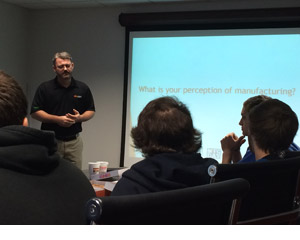by Brian Lundgren , Director of Business Development & Marketing

Older manufacturing professionals are leaving the workforce in record numbers, heading for the green pastures of retirement. The problem? There aren’t enough younger workers to take their place, leaving a critical talent gap across most sectors. According to a 2011 industry report, as many as 600,000 manufacturing jobs (including machinists, technicians and industrial engineers) were vacant that year because employers simply couldn't find the skilled workers to fill them.
So what’s behind the worker shortage? It may be long-held negative perceptions about the manufacturing industry in general. Common misconceptions about manufacturing work are that it’s dirty, boring, and only suitable for unskilled and uneducated individuals.
The truth is, however, that modern manufacturing has become an exciting, high-tech career option that allows workers to engage in cutting-edge computer-aided design and production. And many manufacturing jobs pay extremely well. In 2012, the average manufacturing worker in the U.S. earned $77,505. In one survey of American manufacturing companies, respondents said that a career in their industry is not only rewarding, but also provides competitive wages and benefits.
At Parkinson Technologies, we believe the key to inspiring fresh interest in manufacturing careers is education. We’re doing our part to let younger generations know that manufacturing is about more than pulling levers on an assembly line—by visiting local high schools and colleges to discuss the opportunities in engineering, machining, and machine programming. Parkinson also holds Manufacturing Day events where local high school students are invited for a tour of the facility.
Manufacturing sectors are growing at a rapid clip, opening the door to countless opportunities for today’s young people. By working together to reshape the industry’s image, we can infuse the U.S. manufacturing industry with the bright young talent it requires to maintain healthy growth.